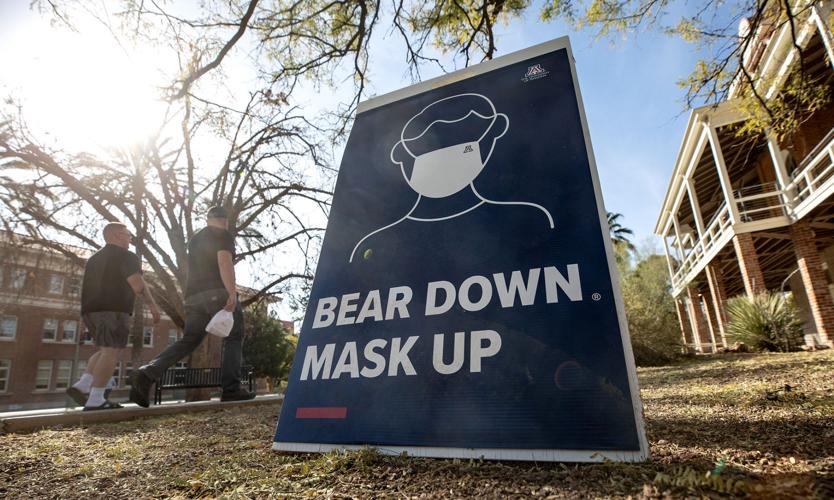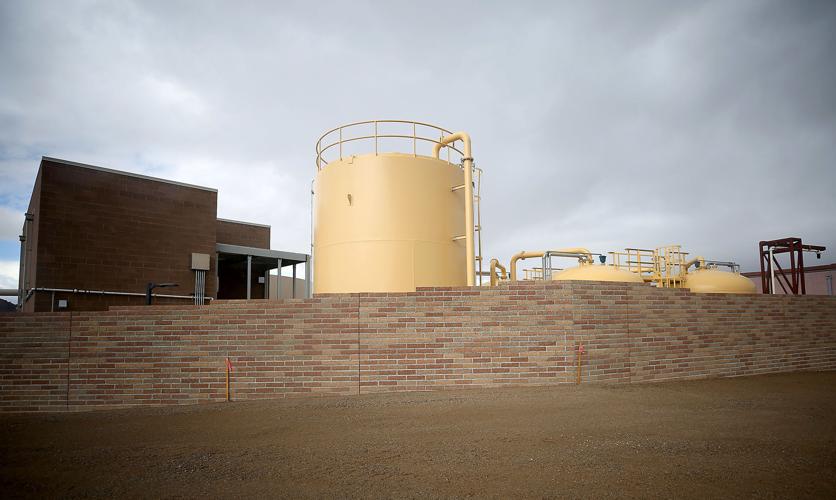Three new University of Arizona-led studies are trying to determine if “forever chemicals” known as PFAS compounds increase the risk of contracting COVID-19 or weaken vaccines’ ability to protect against the disease.
The federally financed studies, now underway, are examining whether PFAS in blood serum can increase COVID-19 risk for firefighters, other first responders, health-care workers and others, including teachers, who hold what are considered essential jobs. Blood serum is the clear fluid left over in blood after potentially clotting materials are removed.
Underlying this research are previous scientific findings that PFAS at high enough concentrations in people have been documented to weaken immune systems’ resistance to disease. Research has also shown the PFAS compounds can suppress humans’ response to other vaccines.
One new study specifically targets the effects of PFAS on firefighters’ antibody response to COVID-19, said UA public health professor Jeff Burgess, lead researcher on all three studies.
In the other two studies, researchers will collect blood serum samples for PFAS as part of projects targeting COVID-19’s presence in various occupational groups, Burgess said.
The studies are financed by the Centers for Disease Control, the U.S. Agency for Toxic Substances Disease Registry, and the National Institute for Environmental Health Sciences.
“They’re trying to really understand the nature of the infection and the risk factors for it, and to understand the effectiveness of vaccinations at preventing COVID-19,” said Burgess, associate dean for research at UA’s Mel and Enid Zuckerman College of Public Health.
“Their main point is to analyze vaccine effectiveness,” Burgess said of the latter two studies.
Previous evidence led to new studies
The three studies would not have been financed without some reason to believe that PFAS exposures could affect COVID-19, he said.
“The information that’s out there is that PFAS exposures can in other infections, predominantly respiratory infections, can increase susceptibility to infection and also reduce immune response to vaccination,” Burgess said.
The CDC and the Agency for Toxic Substances and Disease Registry recognize these problems from past studies, the CDC told the Arizona Daily Star in an email.
“Because COVID-19 is a new public health concern, any and all work around understanding this virus is occurring in a very dynamic environment, where things change and evolve each day,” CDC said.
PFAS compounds are widely used chemical combinations, comprised of a chain of carbon and fluorine atoms linked together. Because the carbon-fluorine bond is one of the strongest known forms of chemical bonding, these chemicals do not degrade in the environment, says the National Institute of Environmental Health Sciences. That’s how they got the nickname “forever chemicals.”
How people are exposed to the chemicals
The highly mobile compounds have turned up regularly in drinking water systems in the Tucson area and nationally. Eighteen drinking water wells in Tucson Water’s system have been shut down due to PFAS contamination, and major parts of the utility’s central and south-side wellfields have PFAS contamination. Two Marana Water well systems have also been tainted by PFAS.
Two treatment plants aimed at removing PFAS and another chemical from well systems serving more than one-third of Marana’s water customers are scheduled to go online in late February or March.
A smaller, pilot cleanup effort by the Arizona Department of Environmental Quality to remove PFAS from water from Tucson Water’s central wellfield is scheduled to start in late spring or early summer 2021.
Various PFAS varieties have been detected in a wide variety of consumer products. They include nonstick and stain-resistant products, carpets, fabrics, food and cardboard packaging, pesticides and cosmetics, said Linda Birnbaum, a former director of the national environmental health science agency. She spoke at a media briefing given recently by the Environmental Working Group, an advocacy group battling to reduce PFAS use and contamination nationally.
“There are more than 200 categories for these chemicals” in which they’re used, said Birnbaum. “They are everywhere. There are over 9,000 of these chemicals that have been intentionally synthesized.
“You can ingest them from drinking water; food or dust. You can inhale them. You can also have dermal exposure in some compounds. Everyone in America has some PFAS in their body,” Birnbaum said.
UA focusing on firefighters, among others
Details of the UA’s PFAS studies:
- One called Arizona Heroes has enlisted 3,000 more than firefighters, first responders and other front-line workers in the state. About 2,000 of them didn’t have COVID-19 when the study started in June and still don’t. Another 1,000 participants either had COVID-19 when they joined the study or have since developed it.
The researchers are trying to enroll another 1,000 such workers who have contracted COVID-19 but haven’t been yet vaccinated.
Those not infected are tested weekly to see if they get infected and regularly provide blood samples to measure antibody levels. Once participants are vaccinated, researchers will keep testing them for COVID-19 and monitoring antibody blood levels.
About 800 of the front-line workers being studied include teachers and workers in food service, retail, child care, manufacturing, utilities and construction, said Karen Lutrick, an assistant UA food and medicine professor. The study’s cost is $7.7 million.
- A study called Recover, in which a CDC-financed, private company is supporting research at several sites nationally, including Tucson and the Miami, Florida, area.
So far about 2,000 people working in similar jobs to those studied in Arizona Heroes have been recruited at several sites for that study, which began in April 2020. Burgess couldn’t provide the study’s total cost.
- A study called Paces is collecting blood from 100 to 120 firefighters in the Tucson area and in Florida who have COVID-19 to determine PFAS levels. Costing nearly $405,000, the study began in September.
Firefighters can be at risk for incurring PFAS contamination because many have used PFAS-tainted firefighting foam on the job, particularly at military bases.
Harvard study found a link
So far, the one study to find a link between PFAS and COVID-19 was led in Denmark by researchers at Harvard University’s School of Public Health.
It examined blood plasma samples from 323 persons, ages 30 to 70, with known infections by SARS-CoV-2, the virus that causes COVID-19.
Two-thirds of the study participants had been hospitalized, and 16% were either put in intensive care or were deceased.
The study found blood samples containing elevated concentrations of a type of PFAS known as PFBA were associated with an increased risk of suffering a more severe course of COVID-19.
But because the study’s participants had generally low exposure levels to PFAS compounds, the question of PFAS-COVID-19 links needs to be studied in populations with elevated exposures, the study concluded. It was published in late 2020 in the journal PLOS One.
The PFBA compound, unlike most other PFAS compounds, can concentrate in peoples’ lungs, but “as far as we know,” all PFAS compounds are toxic to the immune system, said Harvard Professor Phillipe Grandjean, the study’s lead author.
The compounds found most commonly in Tucson-area drinking water have been PFOS and PFOA.
Grandjean said he hopes the studies led by Burgess will result in new findings, “as they can be very relevant to our understanding of COVID-19 and the mystery why some infected patients become very sick while others just get mild symptoms.
“It’s also important for us to appreciate that toxic chemicals do not necessarily cause poisoning but that they may interfere with body functions, including the immune system, and cause greater vulnerability to other disease, such as infections,” he said.
Research important for prevention
These UA studies are hugely important and very timely, said Jamie DeWitt, an East Carolina University researcher who has extensively studied PFAS health impacts.
Besides the knowledge that PFAS exposure can suppress vaccine resistance to infections in general, we also already know that such compounds are widespread in peoples’ bodies and those of animals tested in studies, DeWitt said.
“We also now are in the midst of a pandemic to a novel pathogen (COVID), so we have immune systems naïve to this pathogen and can ask real-time questions about infection rates and severity and how those correlate with internal PFAS blood concentrations,” said DeWitt, an associate professor of pharmacology and toxicology and principal investigator for a research lab that investigates PFAS impacts.
Benefits from such research are particularly important for prevention, she said.
“If a person lives in an area with known PFAS contamination and we know that PFAS increases the risk of COVID, this person can take greater cautions to avoid exposures,” DeWitt said.
63 historical photos of the University of Arizona
University of Arizona in history
Updated
Old Main, the original building on the campus of the University of Arizona.
University of Arizona in history
Updated
University of Arizona students on the steps of Old Main. 1896. HP-168
University of Arizona in history
Updated
Hushed conversations and the rustling of papers were replaced by silence in the main reading room of the old University of Arizona Library at 1013 E. University Blvd. On Feb. 25, 1977, the building stood empty as its collections had been moved down the street to the new UA library. Construction on the original building was begun in 1924, and cost $475,000. Three subsequent additions to the building brought the square footage up to 97,000, but its library days were over. The Arizona State Museum moved into the space.
University of Arizona in history
Updated
UA students, circa 1891 to 1900.
University of Arizona in history
Updated
University of Arizona Old Main 1891. University of Arizona Library Special Collections. HP-165
University of Arizona in history
Updated
University of Arizona students spilled out of their fraternities and dormitories for an impromptu snowball fight during the first snowfall in five years, in February 1956. From the book "Jack Sheaffer's Tucson 1945-1965."
University of Arizona in history
Updated
The University of Arizona's second official infirmary was a low-slung red-brick building constructed in 1936 on the site of a former military barracks.
University of Arizona in history
Updated
Soldiers training for World War I were among the first to use the University of Arizona's first official infirmary. Started in 1919, the infirmary occupied the former home of Reuben R. Schweitzer. Today, the site is occupied by the Koffler Building.
Robert F. Kennedy visit to Tucson
Updated
Robert F. Kennedy at the University of Arizona during his campaign tour. March 29, 1968.
University of Arizona in history
Updated
Students in 1968 exit the UA's infirmary, which underwent a "face lift" the year before that included a new emergency room and accommodations for 50 beds. The building now houses the Sonett Space Sciences Building.
University of Arizona in history
Updated
A 1927 view of the square outside the University of Arizona Main Gate. The drug store stands on the corner of University and Park Avenue.
University of Arizona in history
Updated
The University of Arizona cavalry.
University of Arizona in history
Updated
Members of the athletic staff at the University of Arizona pose on Jan. 11, 1966 at the Washington meeting of the National Collegiate Athletic Association with Secretary of the Interior Stewart Udall and his brother, Rep. Morris Udall, D-Ariz. From left are: Dick Clausen, the University's athletic director; Secretary Udall; Rep. Udall; and Thomas Hall, faculty athletic representative at the Arizona University. The Udall brothers are from Tucson and graduates of the University of Arizona.
UA athletic directors
Updated
1914-57 – Hank Leiber with James Fred "Pop" McKale in the 1930s, the University of Arizona's most-famous coach and first official athletic director. During that time he was twice the baseball coach, and served stints as basketball and football coach. He is a charter member of the Arizona Sports Hall of Fame.
University of Arizona in history
Updated
McKale Center from the air in 1976.
University of Arizona in history
Updated
McKale Center under construction on June 9, 1971.
University of Arizona in history
Updated
South Hall, University of Arizona, 1901.
University of Arizona in history
Updated
Students prepare to whitewash the "A" on Sentinel Peak, also known as "A" Mountain, Sept. 19, 1954.
University of Arizona in history
Updated
U.S. Navy occupied Bear Down Gym during WWII. University of Arizona Library Special Collections. HP-173
University of Arizona in history
Updated
Jubilant University of Arizona players hold their NCAA College Baseball World Series trophy over their heads in victory at Omaha, Nebraska, Saturday, June 19, 1976. Arizona defeated Eastern Michigan, 7-1, to take the 30th National NCAA crown. (AP Photo/Larry Stoddard)
University of Arizona in history
Updated
The empty desert stretches out beyond the 40-acre University of Arizona campus in 1922. The buildings identified are (1) Engineering College, built in 1919; (2) Old Main, built in 1891; and (3) Cochise Hall, a dormitory built in 1922. Today the campus has expanded to 180 acres from Park Avenue area to Campbell Avenue. Speedway cuts diagonally across the pictures. The intersection of Speedway and Campbell is marked.
University of Arizona Homecoming
Updated
1943: Football was suspended in 1943 and 1944 due to World War II. The Desert yearbook published pages of snapshots of former Wildcats now serving in the military. The campus became home to U.S. Navy cadet pilots, who lived in Yavapai Hall, had classroom instruction campus and flight instruction Gilpin Airfield at Kino and I-10, which is now home to Costco and Walmart.
University of Arizona in history
Updated
The Steward Observatory, July 1920. Courtesy University of Arizona library special collections department.
University of Arizona in history
Updated
The Steward Observatory circa 1928. Courtesy University of Arizona special collections.
UA Rush Week in 1968
Updated
Sorority sisters pose for a picture during Rush Week at University of Arizona in Sept. 1968.
University of Arizona in history
Updated
The Old University of Arizona Library.
University of Arizona in history
Updated
A 1929 view of the square outside the University of Arizona Main Gate looking towards downtown Tucson. The photo was taken from the library's upper floor.
University of Arizona in history
Updated
Nils V. "Swede" Nelson, left, shows Art Luppino the "good sportsmanship" award he will receive at dinner given by the Gridiron Club of Boston on Jan. 8, 1955. Luppino, University of Arizona tailback and one of the highest college scorers the nation has ever produced, was voted the award by sportswriters across the nation. It was the ninth award presented by Nelson, onetime Harvard football great. (AP Photo/Peter J. Carroll)
University of Arizona in history
Updated
The beginning of construction of McKale Center dated January 1971, courtesy of the University of Arizona Special Collections.
University of Arizona in history
Updated
Dr. Jack C. Copeland holds a Jarvik-7 artificial heart in the operating room of the University of Arizona Medical Center in Tucson, Ariz., on June 26, 1989. (AP Photo/Steve Mecker)
University of Arizona in history
Updated
ARCHIVE PHOTO - Aerial view University of Arizona, Bear Down building. February 14, 1929 at 11:05 am.
University of Arizona in history
Updated
ARCHIVE PHOTO - Aerial view University of Arizona, Bear Down building and field. Taken at 9:55 am. February 14, 1929.
1997 NCAA Championship: Arizona vs. Kentucky
Updated
UA coach Lute Olson hold the Division I NCAA Championship trophy with his team from left; Jason Lee, Miles Simon, Jason Terry, Lute, Justin Wessel, and Bennett Davison after they defeated Kentucky in the Final Four in Indianapolis.
Lute Olson
Updated
Arizona men's basketball coach Lute Olson holds up the NCAA trophy in front of 30,000 fans inside Arizona stadium at the University of Arizona in Tucson, Ariz., Tuesday, April 1, 1997.
University of Arizona in history
Updated
Comedian Jay Leno, right, gives University of Arizona head coach Lute Olson a can of "Lute Spray" for his snow-white hair during a taping of the "Tonight Show With Jay Leno," Wednesday, April 2, 1997, at NBC studios in Burbank, California. Olson and his team won the National Championship at the NCAA on Monday against Kentucky.
University of Arizona homecoming
Updated
University of Arizona Homecoming
Updated
Nothing like a little deadline pressure in 1963: Gamma Phi Beta sorority members Carole Martin, left, Jackie Ellis and Sharon Boles prepare parts of their Homecoming float for the next day's parade.
Stewart Udall
Updated
Stewart Udall, secretary of the interior under Pres. Lyndon Johnson, speaks to students at the University of Arizona in October, 1968. Udall was a UA graduate. He was stumping for Sen. Hubert Humprhey, the Democratic nominee running for president against Republic Richard Nixon. Udall was one of history's best interior secretaries, working under presidents Kennedy and Johnson, from 1961-69. His brother Morris "Mo" Udall was the beloved U.S. congressman from Southern Arizona. He son Tom is a U.S. senator from New Mexico.
Arizona State College
Updated
Kappa Sigma fraternity members won first place in the 1958 University of Arizona Homecoming Parade “Proposition 200” category with a funeral procession in protest of the controversial ballot initiative to change the name of Arizona State College in Tempe to Arizona State University.
Julian Bond at University of Arizona
Updated
Civil rights leader Julian Bond ponders a questions while talking in the student union at the University of Arizona on Nov. 21, 1968. "The war in Vietnam takes black young men, in ever larger numbers, so crippled in life that they think it better than living in Harlem. With their white comrades, they burn down houses in a war 8,000 miles from home, but cannot live with whites at home."
Kennedy-Johnson presidential campaign in 1960
Updated
Lyndon B. Johnson, at the University of Arizona, shepherded social issues through Congress as president, but the GOP took over after he left office.
Sonora Hall at University of Arizona
Updated
Anne Waaser of Syracuse, NY. checks here snow skis, hoping for a good winter on Mt. Lemmon. Coeds Bonnie Rahod from Oak Park, Ill., Mary Ellen Frost of Munster, Ind., Anne Waaser of Syracuse, NY., and Ann Page of Las Vegas, NV., shared a dorm room at Sonora Hall at the University of Arizona in 1973.
University of Arizona Homecoming
Updated
"Flush Marquette" float in the 1957 UA Homecoming parade in downtown Tucson.
A-7D Corsair II jet fighter crash
Updated
Davis Monthan Air Force Base firefighters spray the area around the engine of an A-7D Corsair II jet fighter after it crashed near the University of Arizona on October 26, 1978 as it was approaching D-M. It crashed on to North Highland Avenue near East Sixth Street missing Mansfeld Junior High School, background, and the UA. A car carrying two sisters was engulfed in flames killing both women. The pilot safely ejected.
College World Series
Updated
Arizona baseball coach Jerry Kindall, left, celebrates with Chip Hale after Arizona beat Florida State 10-2 on June 9, 1986 to win the NCAA College World Series in Omaha.
Arizona Wildcats win College World Series
Updated
Arizona players dog pile on each other following their 4-1 victory over South Carolina in Game 2 to win the NCAA College World Series championship in Omaha, Neb., Monday, June 25, 2012.
Steve Kerr
Updated
University of Arizona basketball coach Lute Olson with starting guard Steve Kerr in during a campus celebration of the team's 1988 NCAA Final Four appearance.
Savannah Guthrie
Updated
Savannah Guthrie in 1992 as a University of Arizona journalism student. The photo was taken for a guest column in the Tucson Citizen.
Snowball fight
Updated
A snowball fight on the University of Arizona Mall on March 3, 1976.
Anderson Chevron gas station
Updated
Anderson Chevron gas station at 745 N. Park Ave. was located near the University of Arizona main gate at Third Street on June 25, 1971.
Graduation
Updated
University of Arizona students listen to a commencement speaker during ceremonies at Arizona Stadium on June 1, 1966.
UA Stadium
Updated
Arizona Stadium starts to take shape as 10,000 new seats are added to the west side along Vine Street as part of the University of Arizona's $1.4 million addition to structure on April 16, 1965. The completion date for the addition to the stadium was extended a month to October 2, 1965. The Wildcats were scheduled to play New Mexico after opening the season with three away games against Utah, Kansas and Wyoming.
1965 in Tucson
Updated
Nearly 1,000 University of Arizona students rioted on May 6, 1965, after male students demanded "panties" at women's dorms. Rocks and bottles were thrown. Sixteen students were arrested.
University of Arizona pitcher Taryne Mowatt
Updated
Pitcher Taryne Mowatt is lifted by teamates after Arizona beat Tennessee during game 3 of their championship series at the 2007 College World Series at ASA Hall of Fame Stadium in Oklahoma City.
Donald Trump in Tucson
Updated
Donald Trump with girlfriend Marla Maples at a University of Arizona basketball game at McKale Center in Tucson on Dec. 27, 1990.
UA computing
Updated
Bruce Crow, an engineering student from Yuma, breaks down a graph on a analog machine at the University of Arizona on March 7, 1957. Crow can turn the coordinates of the graph into numbers which can be put on a punch card and analyzed.
University of Arizona campus, 1959
Updated
University of Arizona students walk around campus mixing occasionally with traffic in front of the Social Sciences building in 1959. Tucson Citizen file.
UA commencement
Updated
University of Arizona graduates seek out friends and family in Arizona Stadium during commencement ceremony on May 31, 1969.
John Hancock Bowl
Updated
University of Arizona quarterback George Malauulu scores against Baylor during the John Hancock Bowl in El Paso, Texas on Dec 31, 1992. Rick Wiley / Tucson Citizen
Famous people who visited Tucson
Updated
Alabama Gov George Wallace addresses an audience at the University of Arizona on January 9, 1964. Months before he had already announced his intention to be the presidential nominee for the 1964 Democratic Party. A year before, Wallace famously declared during his oath of office as governor,"...segregation now, segregation tomorrow, segregation forever." Photo by Jon Kamman / Tucson Citizen
University of Arizona Homecoming
Updated
UA cheerleaders ride in the back of a 1955 Chevy Bel Air during the 1966 UA Homecoming football game against BYU at Arizona Stadium. It started in 1914, ebbed and flowed through the years due to wars, apathy or societal forces, but it remains strong today: The University of Arizona Homecoming week. See 100 images from 100 years of UA Homecoming at tucson.com/retrotucson







